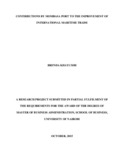| dc.description.abstract | In today„s era of globalization, international trade has evolved to the level where almost no nation can be self-sufficient and global trade has fostered an interdependency and interconnectivity between countries. Shipping has always provided the most cost-effective means of transportation over long distances and containerization has played a crucial role in world transport. International trade is increasing significantly with the expanding global economic integration. The development of the port sector is important to development of maritime trade is an axiom that no nation can afford to ignore in today„s globalized world. This was equally true in the distant past, when maritime nations undertook extensive overseas
maritime explorations and trade to set their mark on global economic history. The objective of the study was to determine the contributions of Mombasa port to the improvement of international maritime trade. The research design adopted was a case study. The study used primary data which was collected using an interview guide. Content analysis was used to analyze the collected data. The findings of the study was that infrastructure development had increased importation and exports, increased availability of goods and increased choice of consumers. The usage of KWATOS system, Simba system and the Kenya National Electronic Single Window
System usage in the port has resulted in increased efficiencies and effectiveness in operations and also enable organizations to deliver flexible services in step with constantly changing customer demands. The study also found out that effective and motivated port management reduces traffic, congestion, promotes international relationships and facilitates international trade by providing conducive and efficient port and port services. The challenges encountered in maritime trade emanates from inefficiency, cumbersome documentation requirements, corruption and political interference. This was found to have resulted in congestions, slows off take of
cargo, increased storage cost, loss of revenue by the government through nonpayment of taxes, increased costs due to bribery and increased taxes and excise. | en_US |

